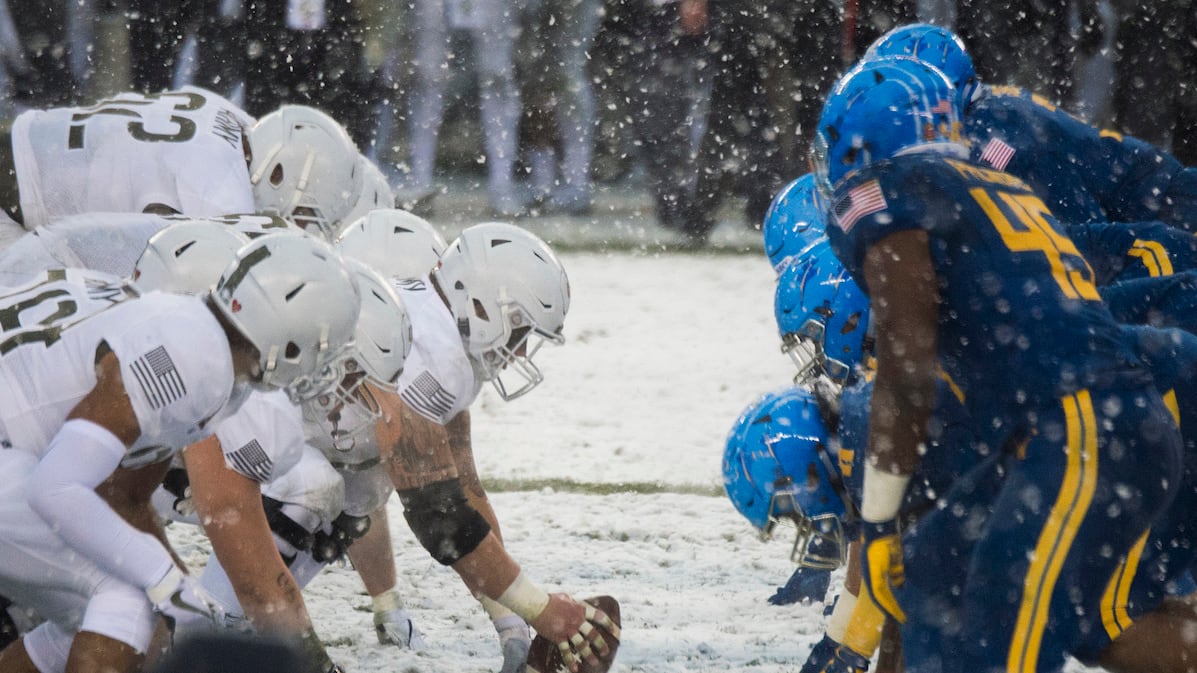PHILADELPHIA — Two former Naval Academy football players talked separately with Military Times surrounding Dec. 8′s Army-Navy game. Phil McConkey, 61, and Jesse Iwuji, 31, are separated by a generation and played in different eras at Naval Academy but both shared similar experiences.
McConkey played in the Army-Navy game as a wide receiver, beating Army three out of four years from 1975 to 1978. Iwuji’s class managed to remain undefeated in four years of play against Army from 2006 to 2009.
Both were first generation Naval Academy graduates. McConkey’s father was an enlisted sailor and his uncle served as a Navy Seabee. Iwuji’s parents were immigrants. His grandfather served in the Nigerian Army and fought in its civil war.
RELATED

Separated by three decades, both saw the Academy as a way to play football at a high level while receiving an excellent education. Each commented on the intensity of being a midshipman and playing football.
“Back then we had a saying, ‘their mission was attrition,’” McConkey said of the rigors of early academy life. “If we knew what we were getting into nobody would have done it.”
Iwuji, meanwhile, had some insight before showing up to the school, already having friends who played football there.
He told Military Times that there were times all of the demands simply meant he had to hunker down into survival mode to get through what was expected of him in his academic, military and football life.
McConkey’s football life continues to be haunted by a late play in a tight 1977 game against Army.
The field was slippery, having been recently re-sodded. It was cold and windy. Navy was down by four points. The Midshipmen were marching down the field in the game’s final minutes. It was fourth and six on the Army 12-yard line. The coach called a pitch to a running back with the option to throw or run the ball.
The back hesitated on the run, then hesitated on the throw, going to run again before finally deciding on a throw toward McConkey in the end zone.
But McConkey was running out of bounds.
“It was devastating. It took me a long time to get… I still haven’t gotten over it,” he said.
Though Iwuji’s class was undefeated against Navy, the games were always tough.
Preseason was rough but once the games started rolling there was a rhythm. The game against Army, however, meant another level of expectations, he said.
“When you get to any rivalry game in college football you can throw away the schedules, you can throw away the records, throw away the stats,” Iwuji said. “It doesn’t matter what you did prior to that. It matters what happens in that game. Emotions are high.”
Once McConkey left the Academy and the high strain of the Army rivalry, he thought he’d left football for good, going on to fulfill another goal instead – becoming a pilot.
“I had two dreams when I was a kid, to fly and to score a touchdown in the Super Bowl,” McConkey said. “When I committed to Navy, I thought I’d get at least a chance at one of them.”
McConkey went on to pilot CH-46 helicopters and serve five years.
But after active service, McConkey’s desire for competition remained. A short while before his time in uniform was up, he resolved to give NFL a try.
“I didn’t want to be an old man like I am now at 61 wondering ‘what if,’ ‘could I have made it?’” he said.
So, the 27-year-old former naval officer took the shot. And it paid off — he became an NFL rookie after five years away from the game.
McConkey would go on to play five seasons in the NFL, both as wide receiver and on special teams, even catching a touchdown pass in the Giants' 39-20 win over the Denver Broncos in Super Bowl XXI.
The veteran of both the Navy and the NFL is now quick to put things in perspective when he reflects on the time he spent in each endeavor.
“They’re not shooting bullets at you like in the military, so it’s relative,” McConkey said, before adding that the focus required to play in the pros is akin to other high pressure situations.
“Landing a helicopter at night on the rolling, pitching deck of a destroyer is good preparation for receiving a punt in the Super Bowl when 11 guys are running downfield trying to decapitate you,” he said.
Iwuji, meanwhile, became a surface warfare officer after graduating from the Academy, serving seven years on active duty before transitioning to the Navy Reserves.
Like McConkey, Iwuji missed competition after leaving football, prompting him to look for another sort of adrenaline rush to fulfill that need. He found it first in amateur drag racing.
Iwuji beefed up his Dodge Challenger and later modified a Corvette ZL-6 for racing, often placing top-five in lower level competitions.
With sustained success, he thought maybe there could be something there. And after searching around the racing world, an acquaintance convinced him to give stock car racing a try.
In 2014, he resolved to go professional and has been involved in NASCAR ever since, he said.
“Boom, that was it.”
Todd South has written about crime, courts, government and the military for multiple publications since 2004 and was named a 2014 Pulitzer finalist for a co-written project on witness intimidation. Todd is a Marine veteran of the Iraq War.




